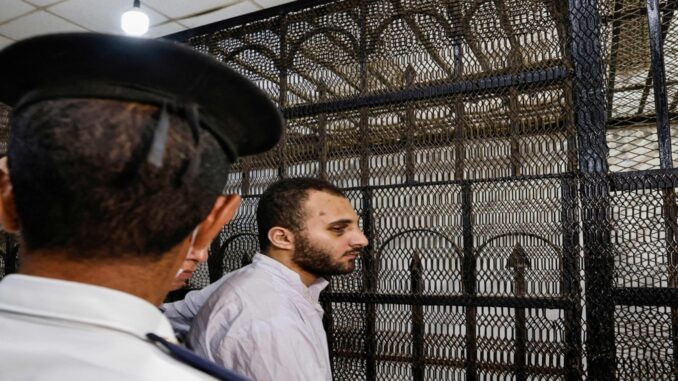
Egyptian criminal court asks parliament to amend legislation governing capital punishment to allow live broadcast of execution of the murderer of his university colleague
The Mansoura Criminal Court has asked parliament to amend the law governing capital punishment to allow for the live broadcast of the execution of Mohamed Adel who was sentenced to death for killing fellow student Naira Ashraf in June.
The court said in a letter that the broadcast would serve as punishment and would deter anyone who might consider committing such a horrific crime.
Last month, the court sentenced Adel to death for killing fellow student Naira by stabbing her in the throat in broad daylight as she was about to enter Mansoura university to take her final exam.
Adel then confessed to deliberately killing Naira after she refused to marry him.
The murder which was recorded by security cameras sent shockwaves across Egypt and the whole Middle East region.
The university student Mohamed Adel was then arrested and placed under investigation for this terrifying crime.
Security cameras at the entrance captured the shocking incident in a video that later went viral under the Arabic hashtags Mansoura University and Justice for Naira Ashraf.
Mohamed Adel later confessed to killing Naira, 21, after she refused his marriage proposals or even to communicate with him on social media.
Passers-by described how Mohamed beat Naira until she fell, hitting her head on the pavement.
Eyewitnesses also said that the killer tried to run away but people who witnessed the stabbing grabbed him and held onto him until the police arrived.
The tragic incident once again underscored the failure of Egyptian authorities to protect women from violence.
Instead, authorities have carried out a campaign of arrests against women with high social media followings, in one case sentencing an influencer to ten years in prison for human trafficking.
In May 2020 Menna Abdelaziz was arrested by security forces after she appeared in a live video saying she had been raped and beaten and spent four months in prison accused of “inciting debauchery” and “violating family principles and values.”
Women’s rights activist Amal Fathy was sentenced to a year in prison after releasing a video on Facebook accusing the Egyptian government of failing to protect sexual harassment victims.
Earlier this year a Cairo court eventually found journalist Rasha Azab not guilty of defamation after she tweeted in solidarity with six women who accused film director Islam Azazi of sexually assaulting them and one of rape.
In a video that was widely shared in the aftermath of Naira’s death, human rights lawyer Nehad Abo Komsan said: “As long as we do not take the complaints of young women seriously, and as long as we say that those fighting for women’s rights are emboldening girls and causing trouble, this will be the result.”



